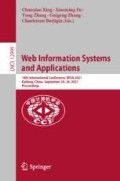Abstract
Distributed iterative processing exists in various application scenarios including large-scale graph analytics and machine learning. Many systems employ bulk synchronous parallel (BSP) model to synchronize the iterations. In these BSP-based systems, the long iterative processing time in distributed environments makes the fault-tolerance crucial. Most BSP-based systems write a checkpoint in either blocking strategy or unblocking strategy to achieve fault-tolerance. However, the blocking strategy involves a checkpointing overhead in failure-free cases, whereas the unblocking strategy also incurs a recovery cost if the BSP-based system has not completed checkpointing in failure cases. Motivated by the trade-off between blocking and unblocking checkpointing, we aim to choose different checkpointing strategy when checkpoint is required during iterative processing, in order to reduce the whole execution time. In particular, we propose a checkpointing choice problem, i.e., how to choose the strategy to minimize the execution time. The challenge is to make a choice during runtime without future information. To address this problem, we provide a hybrid checkpointing, which heuristically chooses either blocking or unblocking checkpointing based on cost evaluation. Our experiments on Giraph, a typical BSP-based system, show that hybrid checkpointing outperforms blocking and unblocking checkpointing.
Access this chapter
Tax calculation will be finalised at checkout
Purchases are for personal use only
References
Apache giraph. https://giraph.apache.org/
Carbone, P., et al.: Apache flink\(_{\rm TM}\): stream and batch processing in a single engine. IEEE Data Eng. Bull. 36, 28–38 (2015)
Dean, J., et al.: MapReduce: simplified data processing on large clusters. In: OSDI, pp. 137–150 (2004)
Gonzalez, J.E., et al.: GraphX: graph processing in a distributed dataflow framework. In: OSDI, pp. 599–613 (2014)
Kraska, T., et al.: MLbase: a distributed machine-learning system. In: CIDR (2013)
Malewicz, G., et al.: Pregel: a system for large-scale graph processing. In: SIGMOD, pp. 135–146 (2010)
Natella, R., et al.: Assessing dependability with software fault injection: a survey. ACM Comput. Surv. 48(3), 1–55 (2016)
Schelter, S., et al.: “All roads lead to Rome”: optimistic recovery for distributed iterative data processing. In: CIKM, pp. 1919–1928 (2013)
Shan, X., Ma, J., Gao, J., Xu, Z., Song, B.: A subgraph query method based on adjacent node features on large-scale label graphs. In: Ni, W., Wang, X., Song, W., Li, Y. (eds.) WISA 2019. LNCS, vol. 11817, pp. 226–238. Springer, Cham (2019). https://doi.org/10.1007/978-3-030-30952-7_24
Shen, Y., et al.: Fast failure recovery in distributed graph processing systems. PVLDB 8(4), 437–448 (2014)
Valiant, L.G.: A bridging model for parallel computation. Commun. ACM 33(8), 103–111 (1990)
Wang, Z., Gu, Yu., Bao, Y., Yu, G., Gao, L.: An I/O-efficient and adaptive fault-tolerant framework for distributed graph computations. Distrib. Parallel Databases 35(2), 177–196 (2017). https://doi.org/10.1007/s10619-017-7192-2
Xu, C., et al.: On fault tolerance for distributed iterative dataflow processing. IEEE Trans. Knowl. Data Eng. 28, 1709–1722 (2017)
Xue, J., et al.: Seraph: an efficient, low-cost system for concurrent graph processing. In: HPDC, pp. 227–238 (2014)
Young, J.W.: A first order approximation to the optimal checkpoint interval. Commun. ACM 17(9), 530–531 (1974)
Zaharia, M., et al.: Resilient distributed datasets: a fault-tolerant abstraction for in-memory cluster computing. In: NSDI, pp. 15–28 (2012)
Acknowledgments
This work was supported by the National Natural Science Foundation of China (No. 61902128), Shanghai Sailing Program (No. 19YF1414200).
Author information
Authors and Affiliations
Corresponding author
Editor information
Editors and Affiliations
Rights and permissions
Copyright information
© 2021 Springer Nature Switzerland AG
About this paper
Cite this paper
Yang, Y., Xu, C., Kong, C., Zhou, A. (2021). Hybrid Checkpointing for Iterative Processing in BSP-Based Systems. In: Xing, C., Fu, X., Zhang, Y., Zhang, G., Borjigin, C. (eds) Web Information Systems and Applications. WISA 2021. Lecture Notes in Computer Science(), vol 12999. Springer, Cham. https://doi.org/10.1007/978-3-030-87571-8_60
Download citation
DOI: https://doi.org/10.1007/978-3-030-87571-8_60
Published:
Publisher Name: Springer, Cham
Print ISBN: 978-3-030-87570-1
Online ISBN: 978-3-030-87571-8
eBook Packages: Computer ScienceComputer Science (R0)


